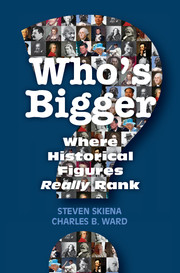Appendix C - Biographical Dictionary
Published online by Cambridge University Press: 05 October 2013
Summary
Here we give a brief description of the 100 most significant people in history, so you can refresh your memory on any of them who seem fuzzy. But first a confession, to give credit where properly due. These definitions have been edited down from the first paragraph of each person's Wikipedia article. We have tried to capture the essence of each article in a text short enough to be sent over Twitter, i.e., at most 140 characters.
Adams, John [61] (1735–1826) was the second president of the United States; he also served as an American lawyer, statesman, diplomat, and political theorist.
Alexander the Great [9] (356–323 B.C.), the King of Macedonia and conqueror of the Persian Empire, is one of the greatest military geniuses of all times.
Ali [89] (598–661) was the cousin and son-in-law of the Islamic prophet Muhammad, and ruled over the Islamic Caliphate from 656 to 661.
Alighieri, Dante [96] (1265–1321) Durante Alighieri, commonly known as Dante, was a major Italian poet of the Middle Ages.
Aquinas, Thomas [90] (1225–1274) was an Italian theologian who is remembered for his attempt to reconcile faith and reason in a comprehensive theology.
Arc, Joan of [95] (1412–1431) was a French heroine and military leader inspired by religious visions to organize resistance against the England.
Aristotle [8] (384–322 B.C.) was a Greek philosopher, a student of Plato, and teacher of Alexander the Great.
- Type
- Chapter
- Information
- Who's Bigger?Where Historical Figures Really Rank, pp. 355 - 360Publisher: Cambridge University PressPrint publication year: 2013



